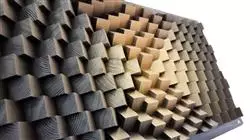University certificate
The world's largest faculty of engineering”
Introduction to the Program
With this 100% online Postgraduate diploma you will have the skills to design and calculate acoustic insulation in enclosed spaces"

Music halls, recording studios, radio or television stations are very demanding environments in terms of soundproofing, although noise insulation in buildings is equally important. A relevance that comes along with the concern about the effects of noise on people's health and well-being.
In this context, technology has advanced in order to improve the analysis and measurement devices, while improving the techniques for the design of spaces. For this reason, TECH has developed this 6-month 100% online university program in Architectural Acoustics Engineering.
It is an intensive program that leads students to achieve advanced and very useful learning in their professional performance as an acoustic engineer. Therefore, this academic itinerary will allow you to delve into the most notorious advances in acoustic insulation, constructive technical solutions, sound absorption in enclosed spaces or vibrations. Likewise, thanks to the Relearningsystem, based on the reiteration of essential content, students will be able to reduce the long hours of study and memorization.
Professionals thus have a unique opportunity to progress in their careers through an academic option that is characterized by its flexible methodology and ease of access to its content. Students only need an electronic device with an Internet connection to view, at any time of the day, the content hosted on the virtual platform.
Enroll now in the top-rated university in the world by its students according to the Trustpilot platform (4.9/5)"
This Postgraduate diploma in Architectural Acoustics Engineering contains the most complete and up-to-date program on the market. The most important features include:
- Development of case studies presented by experts in Acoustics engineering
- The graphic, schematic and eminently practical contents with which it is conceived provide technical and practical information on those disciplines that are essential for professional practice
- Practical exercises where the self-assessment process can be carried out to improve learning
- Its special emphasis on innovative methodologies
- Theoretical lessons, questions to the expert, debate forums on controversial topics, and individual reflection work
- Content that is accessible from any fixed or portable device with an Internet connection
Extend the information on this university program even further through the numerous educational resources offered by TECH"
The program's teaching staff includes professionals from the sector who bring to this program the experience of their work, in addition to recognized specialists from prestigious reference societies and universities.
Its multimedia content, developed with the latest educational technology, will allow the professional a situated and contextual learning, that is, a simulated environment that will provide an immersive training programmed to train in real situations.
The design of this program focuses on Problem-Based Learning, in which the professional will have to try to solve the different professional practice situations that will arise throughout the academic course. For this purpose, the student will be assisted by an innovative interactive video system created by renowned experts.
Get a solid learning about the physical principles that are part of the acoustic behavior"

You will analyze with the best didactic materials the sound fields in rooms by means of wave theory, statistical theory and geometric theory"
Why study at TECH?
TECH is the world’s largest online university. With an impressive catalog of more than 14,000 university programs available in 11 languages, it is positioned as a leader in employability, with a 99% job placement rate. In addition, it relies on an enormous faculty of more than 6,000 professors of the highest international renown.

Study at the world's largest online university and guarantee your professional success. The future starts at TECH”
The world’s best online university according to FORBES
The prestigious Forbes magazine, specialized in business and finance, has highlighted TECH as “the world's best online university” This is what they have recently stated in an article in their digital edition in which they echo the success story of this institution, “thanks to the academic offer it provides, the selection of its teaching staff, and an innovative learning method aimed at educating the professionals of the future”
A revolutionary study method, a cutting-edge faculty and a practical focus: the key to TECH's success.
The most complete study plans on the university scene
TECH offers the most complete study plans on the university scene, with syllabuses that cover fundamental concepts and, at the same time, the main scientific advances in their specific scientific areas. In addition, these programs are continuously being updated to guarantee students the academic vanguard and the most in-demand professional skills. In this way, the university's qualifications provide its graduates with a significant advantage to propel their careers to success.
TECH offers the most comprehensive and intensive study plans on the current university scene.
A world-class teaching staff
TECH's teaching staff is made up of more than 6,000 professors with the highest international recognition. Professors, researchers and top executives of multinational companies, including Isaiah Covington, performance coach of the Boston Celtics; Magda Romanska, principal investigator at Harvard MetaLAB; Ignacio Wistumba, chairman of the department of translational molecular pathology at MD Anderson Cancer Center; and D.W. Pine, creative director of TIME magazine, among others.
Internationally renowned experts, specialized in different branches of Health, Technology, Communication and Business, form part of the TECH faculty.
A unique learning method
TECH is the first university to use Relearning in all its programs. It is the best online learning methodology, accredited with international teaching quality certifications, provided by prestigious educational agencies. In addition, this disruptive educational model is complemented with the “Case Method”, thereby setting up a unique online teaching strategy. Innovative teaching resources are also implemented, including detailed videos, infographics and interactive summaries.
TECH combines Relearning and the Case Method in all its university programs to guarantee excellent theoretical and practical learning, studying whenever and wherever you want.
The world's largest online university
TECH is the world’s largest online university. We are the largest educational institution, with the best and widest online educational catalog, one hundred percent online and covering the vast majority of areas of knowledge. We offer a large selection of our own degrees and accredited online undergraduate and postgraduate degrees. In total, more than 14,000 university degrees, in eleven different languages, make us the largest educational largest in the world.
TECH has the world's most extensive catalog of academic and official programs, available in more than 11 languages.
Google Premier Partner
The American technology giant has awarded TECH the Google Google Premier Partner badge. This award, which is only available to 3% of the world's companies, highlights the efficient, flexible and tailored experience that this university provides to students. The recognition as a Google Premier Partner not only accredits the maximum rigor, performance and investment in TECH's digital infrastructures, but also places this university as one of the world's leading technology companies.
Google has positioned TECH in the top 3% of the world's most important technology companies by awarding it its Google Premier Partner badge.
The official online university of the NBA
TECH is the official online university of the NBA. Thanks to our agreement with the biggest league in basketball, we offer our students exclusive university programs, as well as a wide variety of educational resources focused on the business of the league and other areas of the sports industry. Each program is made up of a uniquely designed syllabus and features exceptional guest hosts: professionals with a distinguished sports background who will offer their expertise on the most relevant topics.
TECH has been selected by the NBA, the world's top basketball league, as its official online university.
The top-rated university by its students
Students have positioned TECH as the world's top-rated university on the main review websites, with a highest rating of 4.9 out of 5, obtained from more than 1,000 reviews. These results consolidate TECH as the benchmark university institution at an international level, reflecting the excellence and positive impact of its educational model.” reflecting the excellence and positive impact of its educational model.”
TECH is the world’s top-rated university by its students.
Leaders in employability
TECH has managed to become the leading university in employability. 99% of its students obtain jobs in the academic field they have studied, within one year of completing any of the university's programs. A similar number achieve immediate career enhancement. All this thanks to a study methodology that bases its effectiveness on the acquisition of practical skills, which are absolutely necessary for professional development.
99% of TECH graduates find a job within a year of completing their studies.
Postgraduate Diploma in Architectural Acoustics Engineering
TECH's Postgraduate Diploma in Architectural Acoustics Engineering academic program is an excellent opportunity for those interested in the design and management of sound in architectural spaces. This program focuses on providing students with the knowledge and skills necessary to understand and manage the technical and aesthetic aspects of sound in architecture, all under online education modality, which allows time management of the participants. Architectural Acoustical Engineering is a fundamental discipline in the creation of acoustically comfortable and efficient spaces. Whether in the construction of concert halls, recording studios, auditoriums or any other type of enclosure, the correct handling of sound is essential to ensure the quality and well-being of those who occupy these spaces.
Study with a practical approach 100% online
Through a combination of theoretical online classes and practical exercises, participants will acquire a broad knowledge in areas such as the physics of sound, the design of acoustic spaces, audio recording and reproduction technology, as well as the use of specialized acoustics software. In addition, students will have the opportunity to apply what they have learned in real projects, working in multidisciplinary teams to design and develop innovative acoustic solutions. This practical experience will allow them to develop teamwork, communication and decision making skills, essential competencies in the work field. At the end of the program, participants will be prepared to face the challenges of the architectural acoustic engineering industry, being able to work in architectural firms, construction companies, sound design agencies, among others. The Postgraduate Diploma in Architectural Acoustics Engineering is a safe investment for those who wish to specialize in a discipline that combines science, art and technology. Don't miss the opportunity to be part of this academic program and discover how sound can make a difference in our architectural spaces. Enroll now and become an expert in architectural acoustic engineering!







